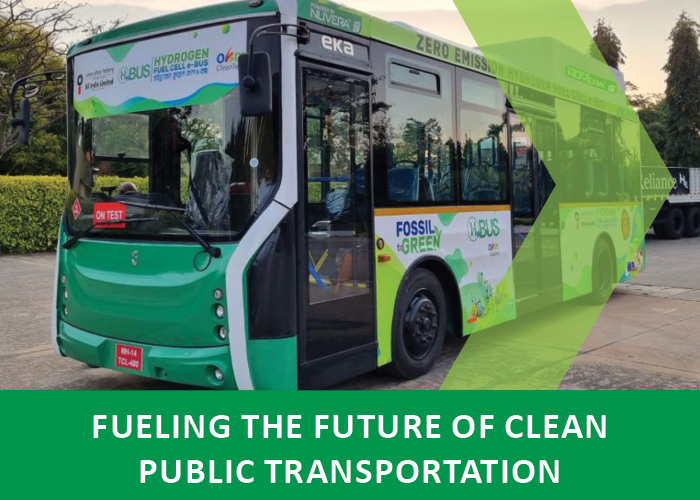Millions of people rely on public transportation – systems that serve as lifelines connecting people and places while building thriving communities, creating jobs and easing traffic congestion.
However, public transportation is also a very significant contributor to noise and air pollution, since its vehicles are often powered by fossil fuels that emit greenhouse gases. As the push to decarbonize this sector gains momentum, hydrogen fuel cell-powered vehicles are emerging as a key solution to meet clean air requirements for public transportation.
Nuvera® E-Series Fuel Cell Engines deliver high-efficiency performance in a compact package that allow them to fit into standard vehicle engine compartments. Fuel cell engines can power full-size transit buses and other platforms critical to public transportation operations, such as light rail, ferries, and shuttle buses. Vehicles and vessels powered by fuel cells are emissions-free, resulting in cleaner air and healthier, quieter neighborhoods.
Joining the Industry
Emphasizing the urgency of transitioning to zero-emission fleets, transit agencies, OEMs, and community and environmental organizations throughout the transportation industry are responding to federal, state and local regulations and mandates by undertaking a wide range of research, product innovation and demonstration programs.
This October, Nuvera attended the American Public Transportation Association Expo in Orlando to exhibit a hydrogen fuel cell engine and to engage in discussions around hydrogen’s potential in the public transportation sector. As the world’s largest public transportation showcase, the expo served as the ideal stage to connect with industry peers who are revolutionizing the technology that powers it.
The Center for Transportation and the Environment (CTE) also recently hosted the Zero Emission Bus Conference to gather the people and companies leading the charge toward electrification using clean, efficient, and sustainable transportation technologies. As a long-time CTE member and collaborator, Nuvera shares the vision of improving transportation services while reducing their environmental impacts, including electrifying fleets in the public sector using advanced fuel cell technology.
The California Air Resources Board has laid out ambitious goals for decarbonizing transportation within the state. All public transit agencies in California must gradually transition to a 100% zero-emission bus fleet by 2040. By 2026, 50% of large and 25% of small transit agencies’ new bus purchases must be zero-emission. By 2029, 100% of large and small transit agencies’ new bus purchases must be zero-emission.
In June, the U.S. Department of Transportation’s Federal Transit Administration announced the Biden-Harris administration has allotted nearly $1.7 billion to help put better, cleaner buses on the roads in communities across the country. This funding invests in more than 1,700 buses –nearly half of which will be zero-emission models, bringing the total number of zero-emission transit buses funded by the Bipartisan Infrastructure Law over two years to more than 1,800, and more than doubling the number of zero-emission transit buses on America’s roadways.
Modernizing Bus Fleets
As cities and towns implement clean transportation policies to improve air quality, reduce greenhouse emissions, and improve energy efficiency, hydrogen fuel cells are coming into focus as an attractive alternative to internal combustion engines.
Typically offering the driving range required to handle all routes, fuel cell electric buses can provide a one-to-one replacement of conventionally powered vehicles. Routes that are too demanding for battery-powered buses, because of length or hilly terrain, or extreme temperature conditions, can often be completed with fuel cells.
Fuel cell-powered electric buses offer significant and convincing advantages over vehicles powered by internal combustion engines:
- Refueling in the same amount of time as diesel and natural gas vehicles
- Zero tailpipe emissions, except for water vapor
- No greenhouse gas emissions when powered with renewable hydrogen
- A quiet and comfortable ride
- Improved fuel efficiency and reduced maintenance, saving on operating costs
- Reduced ambient noise in neighborhoods
- When compared to battery-powered buses, fuel cell buses provide a significant weight reduction
Nuvera has already provided fuel cell engines to power fuel cell e-buses in the China and India markets, helping both countries embrace hydrogen solutions for cleaner transportation. Nuvera also managed a fuel cell bus demonstration program at the Massachusetts MBTA system. Public transit leaders know that zero-emission vehicles are critical to the future of transportation, and many countries are setting goals and mandates to electrify entire transit fleets.
As regions around the globe accelerate the shift toward a cleaner and more sustainable future, Nuvera is proud to offer its expertise in hydrogen fuel cell solutions for innovative transportation initiatives. Learn more about our experience powering buses, marine vessels and other public transportation platforms.

